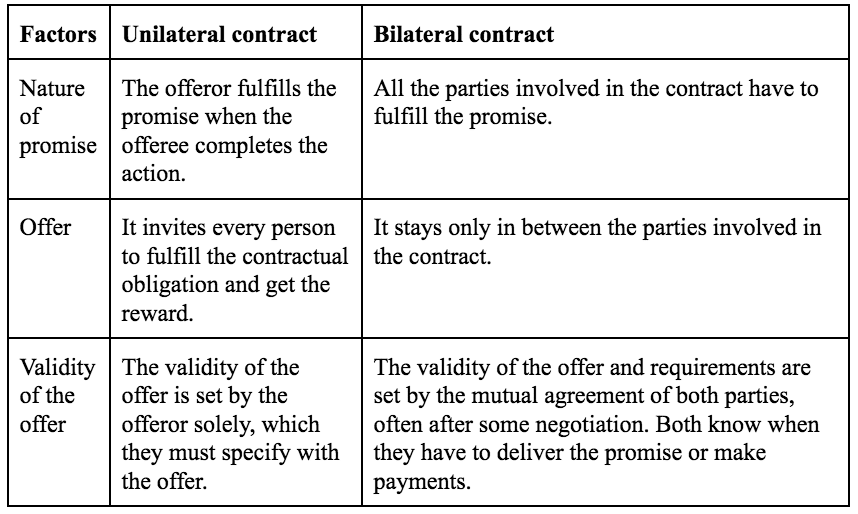Businesses use contracts to protect their interests and mitigate risk. A contract is an agreement mutually decided by two or more parties to create a legal obligation. Business professionals primarily use two types of contracts—unilateral contracts and bilateral contracts.
Unilateral contracts involve one party making a promise to a general group of people. Bilateral contracts need at least two parties to negotiate and act upon a promise. They both have more differences and similarities. Knowing the difference between unilateral vs. bilateral contracts can help business professionals enter business deals confidently.
This article will help you understand unilateral vs. bilateral contracts with some easy examples.
What is a unilateral contract?
The term “unilateral” refers to the actions undertaken by one individual or group alone. In business contracts, unilateral contracts only involve one person making a promise or agreeing to a specific thing.
In a unilateral contract, the offer is made generally to a group of people or a specific person. It may or may not be accepted and can only be forced if the second party (offeree) agrees to the offer through some actions. The offeree is in no way obliged to act upon the offers made via unilateral contracts. However, if an offeree performs the asked action, the offeror has to act as per the promise specified on the contract. In case the offeror doesn’t return the promise as per the contract, the offer won’t be considered accepted.
Example of unilateral contract: Reward contract
Unilateral contracts are ideal for situations where the offeror is willing to pay for any action in any way.
These open requests are good examples of unilateral contracts. Offerers use unilateral contracts to make optional or broad requests in an open economy. The requests are only paid for in the event some specifications are met. A common type of request is a reward. For instance, in a criminal case, the government may offer a reward to someone who provides important information about the “wanted” criminal or the case itself.
The reward can be given to one person or to multiple individuals who meet the specified criteria. Similarly, a unilateral contract may also have a request for labor.
For instance, a company or individual may advertise a request for agreeing to pay a certain amount if the respondent does a specific task. Suppose Person A advertises to pay $500 to someone who can tutor them for an upcoming exam. Person B tutors Person A for the exam. Now, Person A has to pay $500 to Person B as per the advertised request.
Open requests are widespread in our everyday lives. For instance, when your pet gets lost, you first print flyers and distribute them in your neighborhood. Then, you post a “missing reward” advertisement in the newspaper or online where you offer a $150 reward to anyone who finds and returns your pet.
This is a prime example of a unilateral contract since you are promising to reward the person who fulfills the obligation of finding your pet. You’re the only entity that came up with the reward money, and no specific person was obliged to fulfill your requirements.
Insurance contracts
Insurance contracts are another example of unilateral contracts. When you consult insurance services, the company promises to pay you a certain amount if a certain event occurs. However, if that event doesn’t happen, the company is not obliged to pay you any money.
Can unilateral contracts be breached?
Unilateral contracts can be revoked anytime before the promisee or offeree begins acting upon the specified obligation. However, if the offeree has started acting, the contract revocation depends on the type of action the promisor or offerer specified in the contract:
- Performance type contracts: These are unilateral contracts where the offeror offers a specific amount, let’s say $200, to anyone who helps them with a task. The agreement can’t be revoked once an offeree starts acting upon the job.
- Reward-type contracts: These are unilateral contracts that are usually made for offering rewards. Suppose you have offered $150 for your lost pet. You can revoke this contract, even if the offeree has already started working on it. But, it should be done before the task is completed.
Previously, business laws allowed the revocation of performance-type contracts, even if the offeree has started acting upon it. However, this rule isn’t applicable anymore. Once the offeree begins acting and completes the task, the offeror is obliged to make the payment, or it will be considered a breach by the offeror.
What is a bilateral contract?
A bilateral contract is an agreement that binds two or more parties legally on pre-decided terms and conditions. The contract is typically in writing and requires both parties to perform the said actions. It is the most basic type of contract in the business industry.
In bilateral contracts, both parties negotiate and agree on a promise to perform contractual obligations. For a bilateral contract to be valid, the offeror or promisor has to make an offer that needs to be accepted by the offeree or the promisee. The contract needs to have a defined exchange of value and must have an adequate legal capacity for both parties.
Compared to unilateral contracts, bilateral contracts are more commonly used for our basic business transactions. For instance, when you visit your favorite restaurant to have a cup of coffee, you place an order in exchange for money. Similarly, when you buy a dress, receive medical treatment, or purchase a book at a library, you’re participating in a bilateral contract.
In all of the above situations, you are promising to pay a specific amount—a particular action—to another person in return for their product or service, another particular action.
But remember that you’re not actually signing a contract in these situations as it is mostly a business requirement for bilateral contracts.
For instance, take the example of a real estate agreement. In such agreements, a contract is signed between you and the real estate company to purchase a house. Now, both entities have to fulfill certain obligations. The company has to provide you with your desired house, and in return, you are obliged to pay a fixed amount of money for it.
Can bilateral contracts be breached?
Like unilateral contracts, bilateral contracts can also be breached. When one party refuses to act upon its portion of the promise or prevents the other person from performing their task, a bilateral contract is usually revoked.
Some common circumstances that lead to the revocation of bilateral contracts are when a coworker refuses to complete their part of the promise or if an employee acts against the terms & conditions of the agreement.
Unilateral vs. bilateral contracts: What is the difference?
The most obvious difference between unilateral vs. bilateral contracts is the number of parties involved.
Unilateral contracts rely on only one party to create a contract or promise for a specified or general group of people. On the other hand, bilateral contracts need at least two parties to negotiate, agree, and act upon a promise. Simply put, a unilateral contract is accepted after the action is completed, while the bilateral contract is accepted on a mutual signature.
Apart from these significant differences, both contracts also differ in other factors. The unilateral vs. bilateral contract comparison below will help you understand them better.
Similarities between unilateral and bilateral contracts
There are so many aspects that differentiate unilateral contracts from bilateral contracts. But do they have any similarities? Yes, they do. Here are some of them:
- Both types of arrangements bind the parties legally. This means the law enforces the entities to fulfill the contractual obligations, or else, they may have to bear legal consequences.
The two contracts involve two essential elements. These are a promise and consideration.
While bilateral agreements are widely used in business, unilateral contracts are more common in our day-to-day dealings. From the business point of view, bilateral contracts protect the interests of both parties—the offeror and the offeree. In addition, it builds trust and confidence between two entities since all the provisions are mutually decided between them.
How contract management software can help
No business can work without the right tools in this technologically advanced world. Since a lot is going in companies, contract lifecycle management (CLM) software can help ease your workload and take care of your contracts. CLM systems can centralize contract storage, automate reminders and notifications, track contract versions, monitor performance, integrate with other systems, and help with compliance management.
Specifically, CLM tools can store unilateral contracts in a central location, organize them based on various criteria, set reminders for important dates, track changes to contracts, monitor the progress of performance milestones, integrate with other systems to share data and automate processes, and ensure compliance with relevant regulations and industry standards.
By leveraging these capabilities, a CLM platform can help organizations effectively manage unilateral contracts, reduce risk, and improve efficiency. This is particularly useful for managing purchase orders, warranties, and licenses, which are common types of unilateral contracts. Learn how to choose the right tool for you.
Ironclad is not a law firm, and this post does not constitute or contain legal advice. To evaluate the accuracy, sufficiency, or reliability of the ideas and guidance reflected here, or the applicability of these materials to your business, you should consult with a licensed attorney. Use of and access to any of the resources contained within Ironclad’s site do not create an attorney-client relationship between the user and Ironclad.
- What is a unilateral contract?
- Can unilateral contracts be breached?
- What is a bilateral contract?
- Can bilateral contracts be breached?
- Unilateral vs. bilateral contracts: What is the difference?
- Similarities between unilateral and bilateral contracts
- How contract management software can help
Want more content like this? Sign up for our monthly newsletter.




